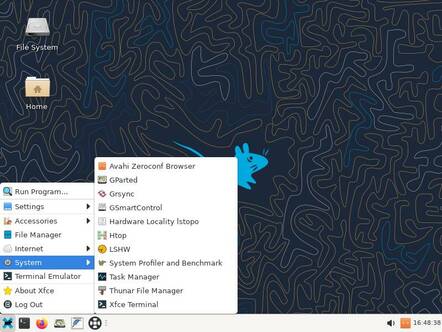This article is more than 1 year old
SystemRescue 9.06 is here with the shiny new Xfce 4.18
It also boasts MemTest86+ 6, which now can boot and run on UEFI machines
SystemRescue 9.06 may only be a point release, but it has some good stuff including the newly released Xfce, MemTest86+ version 6, and a new USB-key-writing tool.
We took at look at SystemRescue 9 when it appeared, nearly a year ago now. While version 9.06 (available here) isn't a hugely different version number, it actually has some significant changes which merit a fresh look.
One of the important changes is functional. As its name suggests, SystemRescue was designed with a specific purpose in mind: troubleshooting flaky computers. For many years, one of the handiest tools for this has been MemTest86+, and for a long time it was included on the boot menu of many Linux distros. The snag is that until very recently, MemTest86+ only worked on BIOS-based PCs.
- Rescuezilla 2.4 is here: Grab it before you need it
- Patch Tuesday update is causing some Windows 10 systems to blue screen
- Computers shouldn't smoke. Cigarettes aren't healthy for anyone
- Plop. That's the sound of a boot manager booting PCs off media they can't start from
The new version of SystemRescue includes Memtest86+ version 6, which was released back in October. This is the first non-beta version in nine years, and has a major new feature: v6 supports UEFI. This means it works on recent, UEFI-only hardware such as Intel-based Apple Macs.
This is significant because the best way to use MemTest86+ is to boot it on bare metal: firstly, because you can test machines which due to faulty RAM may not be able to load a modern, multi-gigabyte OS; and secondly, because by booting it, MemTest86+ can test more of the machine's RAM. The program itself is tiny, taking only 141kB on disk. If your computer has 8GB of memory, booting directly into MemTest86+ means you can test all but about 0.00002 percent of it.

SystemRescue 9.06 is more useful on more kit than ever, and includes the gleaming new version of Xfce too
Another new feature is mainly cosmetic, but good to have all the same: it's the first new distro release the Reg FOSS desk has seen that contains the final release of Xfce 4.18, which we mentioned was coming soon earlier this month. Now it's here, and SystemRescue includes it. It has picked up the new version so fast it's based on Arch Linux, which is often one of the first distros to get new releases of things – perceptive readers will have noticed that the screenshot in our coverage of IceWM 3.0 used Arch Linux. Until SystemRescue 6 in 2019, SystemRescue used Gentoo.
The relevance of it being in SystemRescue is that if you want to take a look at the new version of Xfce, you don't need to install anything at all. SystemRescue is designed to be used as a live environment, and it's only a 748MB download.
Another neat feature is somewhat external to the distro itself. It's the new SystemRescue USBWriter application. This is a small tool to write the ISO image onto a USB key, distributed as an AppImage so it will run on any distro. It's just 6MB in size, compared to the popular Balena Etcher app, which is 91MB. The SystemRescue USB writer is text-based and menu-driven, and much less scary than running the dd command and possibly accidentally over-writing your hard disk. ®
Bootnote
In case you were wondering, MemTest86+ is not the same as MemTest86, which is proprietary freeware from PassMark. ®
